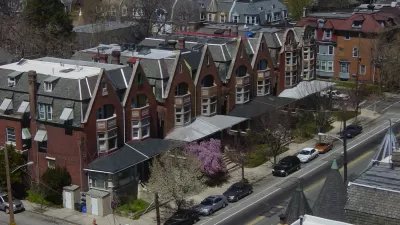Despite the historic importance of a vast majority of the city of Philadelphia's buildings, demolitions are happening at a faster rate than ever.

"Philadelphia’s history isn’t a burden," writes Ashley Hahn in the Philadelphia Inquirer, but it's certainly being treated that way. According to Hahn, "increasing numbers of old buildings are demolished annually by city contractors and private owners, landfilling reusable materials and untold histories."
While "[m]ore than two-thirds of Philadelphia buildings were built more than 50 years ago, making them potentially eligible for local historic designation on the basis of age alone," less than 3% of the city's buildings have historic designation. That protected segment, writes Hahn, "unfortunately reflects a predominantly white version of the city’s past."
"The city’s Department of Planning and Development is attempting to correct this failure through a grant-funded pilot project to develop and test a survey identifying culturally significant places overlooked by traditional preservation." The survey "will be driven by the communities whose histories the historic register has excluded, particularly Black Philadelphia."
The project, "done right," will likely take years. "The process could help build public trust in the city’s preservation system as it becomes less exclusionary and more representative of Philadelphia’s diverse heritage," writes Hahn, "[b]ut it does nothing to keep that history standing in the meantime." Hahn recommends that the city immediately "enact a demolition review policy, at least until a citywide survey is completed." Otherwise, " the city is undercutting its well-intentioned survey before it starts."
In other cities, permit applications to demolish buildings that meet "basic eligibility for local designation" trigger a review process. "It’s far faster to get a demolition permit than it is to designate a building as historic, which can take months. A demolition review policy would help level the playing field, instead of keeping it easy to level the city’s unprotected heritage."
FULL STORY: Welcome to Demodelphia, where our historic buildings are treated like a burden

Planetizen Federal Action Tracker
A weekly monitor of how Trump’s orders and actions are impacting planners and planning in America.

Maui's Vacation Rental Debate Turns Ugly
Verbal attacks, misinformation campaigns and fistfights plague a high-stakes debate to convert thousands of vacation rentals into long-term housing.

San Francisco Suspends Traffic Calming Amidst Record Deaths
Citing “a challenging fiscal landscape,” the city will cease the program on the heels of 42 traffic deaths, including 24 pedestrians.

Amtrak Rolls Out New Orleans to Alabama “Mardi Gras” Train
The new service will operate morning and evening departures between Mobile and New Orleans.

The Subversive Car-Free Guide to Trump's Great American Road Trip
Car-free ways to access Chicagoland’s best tourist attractions.

San Antonio and Austin are Fusing Into one Massive Megaregion
The region spanning the two central Texas cities is growing fast, posing challenges for local infrastructure and water supplies.
Urban Design for Planners 1: Software Tools
This six-course series explores essential urban design concepts using open source software and equips planners with the tools they need to participate fully in the urban design process.
Planning for Universal Design
Learn the tools for implementing Universal Design in planning regulations.
Heyer Gruel & Associates PA
JM Goldson LLC
Custer County Colorado
City of Camden Redevelopment Agency
City of Astoria
Transportation Research & Education Center (TREC) at Portland State University
Jefferson Parish Government
Camden Redevelopment Agency
City of Claremont





























